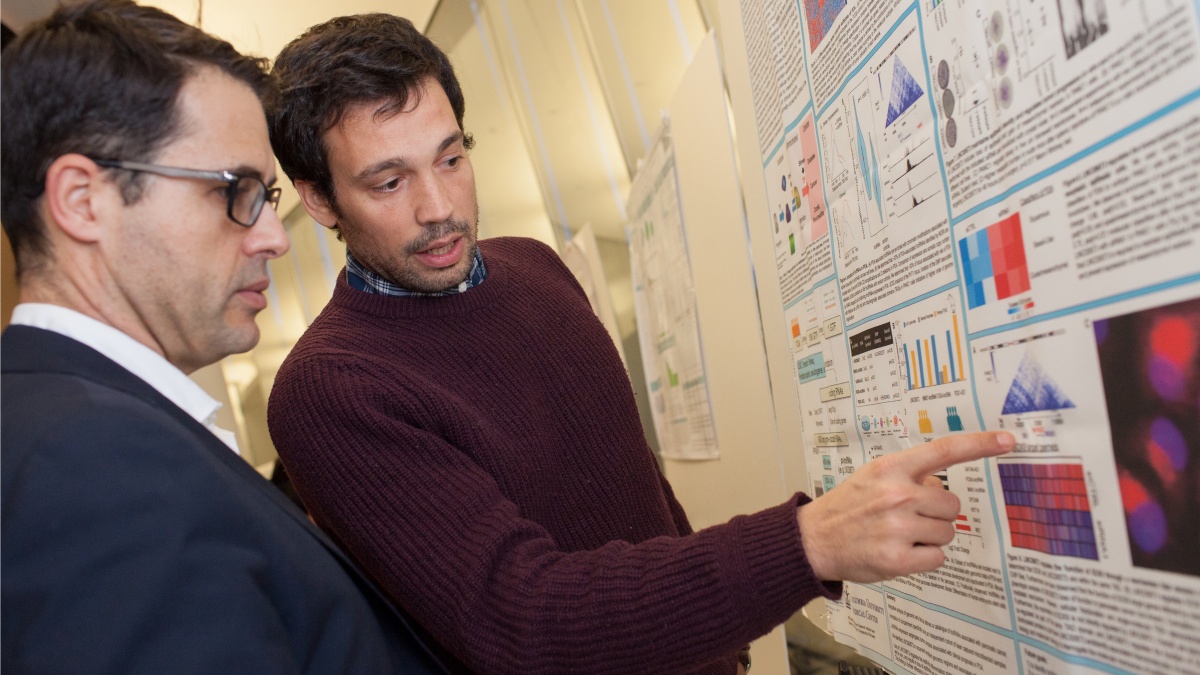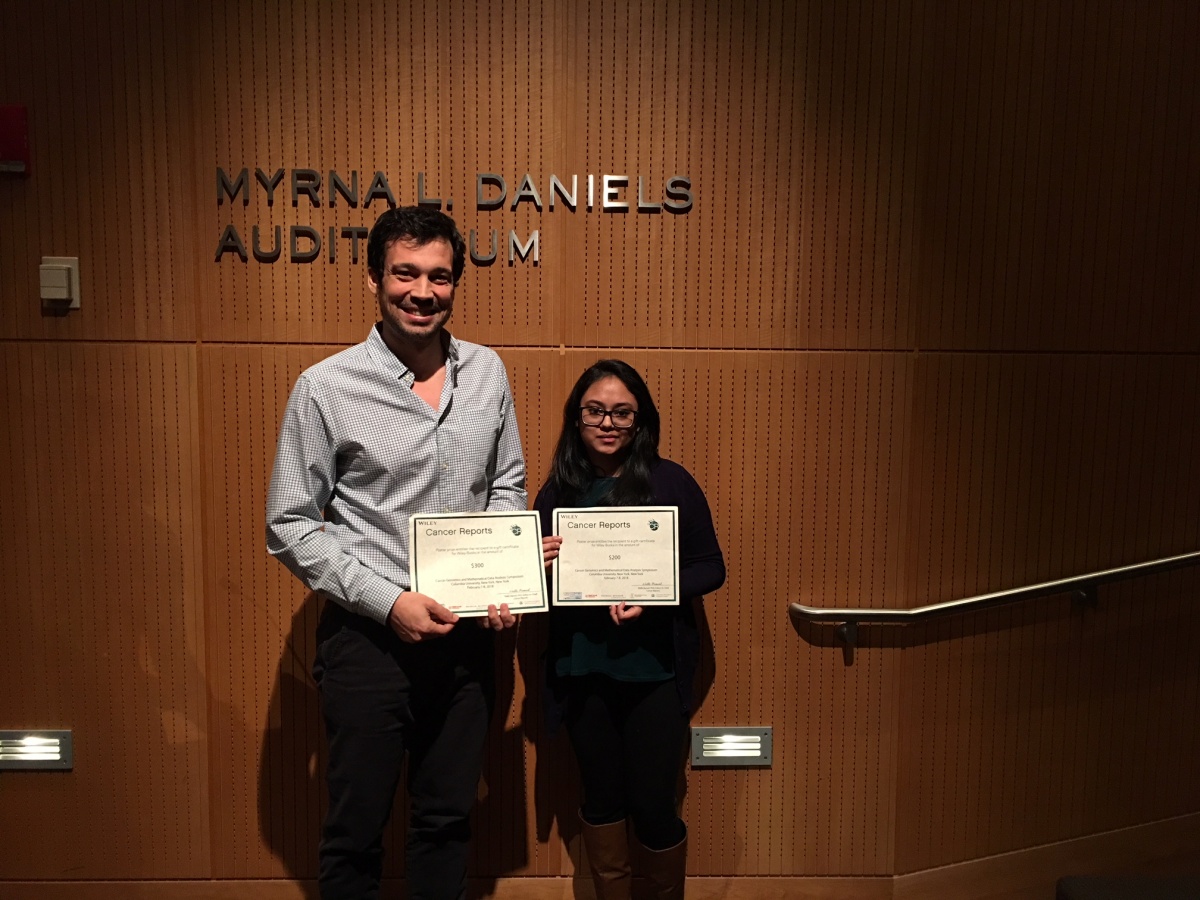News
Symposium Spotlights Advancements in Translational Cancer Research

Pictured above, Adolfo Ferrando (left), professor of pediatrics and of pathology and cell biology at Columbia, with Luis Arnes, associate research scientist and first-place winner of the symposium's poster competition; For photos from the symposium, visit the gallery page . Credit: Lydia Lee Photography
A multidisciplinary team of researchers across Columbia University have been busy addressing the complex challenges in basic and translational cancer research. Faculty and investigators are bridging their expertise in fields ranging from mathematics, biology, and engineering to physics, genomics, and chemistry to develop innovative approaches to better understand, for instance, cancer disease progression, drug resistance, and the systems-wide network of tumor evolution.
Central to this ongoing work is research grounded in cancer genomics and mathematical data analysis explored during a two-day conference Feb. 7-8 co-hosted by the National Cancer Institute (NCI) centers at Columbia University Medical Center, Cornell University, and Memorial Sloan Kettering Cancer Center. (Visit the Rabadan Lab YouTube Channel for video of the symposium).
"Genomics is becoming an important tool for the quantitative study of biological systems,” says Raul Rabadan, PhD , professor of systems biology at Columbia and director of the Center for Topology of Cancer Evolution and Heterogeneity and of the Program for Mathematical Genomics . “This meeting organized by four different NCI centers addressed some of the important challenges and new perspectives on the quantitative understanding of cancer using genomics tools.”
Guest speakers included leading computational biologists, physicists, engineers, mathematicians, and oncologists, who delivered talks on topics, such as cancer precision medicine, the evolutionary dynamics of cancer and response to treatment, cancer heterogeneity, and identifying cancer vulnerabilities on an individual cell basis. Day one of the conference wrapped with a networking social and poster session—open to students and post-doctoral scientists—with prizes sponsored by Cancer Reports , a new journal for cancer research published by Wiley .

Two of the poster prizewinners; Arnes (left) with Kamrun Begum
The winners of the poster session were Luis Arnes of the Rabadan Lab, James Bannon of New York University’s Courant Institute, and Kamrun Begum of the Barry Honig lab. Each prizewinner received vouchers for Wiley books.
About the NCI Centers at Columbia
The Center for Topology of Cancer Evolution and Heterogeneity at Columbia, co-directed by Drs. Rabadan and Antonio Iavarone , professor of pathology and cell biology and of neurology at Columbia, represents NCI’s Physical Sciences in Oncology Network (PSOC). The interdisciplinary center, which includes experts in cancer genomics, developmental biology, single-cell genomics, machine learning, and topological data analysis, are working to develop and validate a set of complementary approaches that will provide the cancer research community with a framework for unraveling tumor complexity.
Andrea Califano, Dr. , chair of Columbia’s Department of Systems Biology, and Barry Honig, PhD , professor of systems biology and of biochemistry and molecular biophysics at Columbia, who both spoke at the symposium, co-direct the NCI’s Cancer Systems Biology Consortium at Columbia, the Center for Cancer Systems Therapeutics (CaST) . CaST, which is comprised of faculty from several departments and institutes across Columbia, focuses on the use of experimental biology combined with multi-dimensional data analysis and systems engineering in its approach to tackling challenges in translational cancer research. CaST investigators are experts in the development of computational methods for analyzing functional and structural data, high-throughput technologies for single-cell profiling, high-throughput genetic and pharmacological screening, software development, and experimental methods for studying tumor evolution in vivo.
The two additional NCI centers, which co-hosted the symposium, include the Cornell Center on the Physics of Cancer Metabolism , co-directed by Drs. Claudia Fischbach-Teschl and Lewis C. Cantley, and Memorial Sloan Kettering’s Center for Cancer Systems Immunology , led by Drs. Christina Leslie and Alexander Rudensky. The interdisciplinary team at MSK’s Center for Cancer Systems Immunology is conducting research in the areas of immunotherapy, gene regulation, cancer genetics, and metastasis. At Cornell’s Center on the Physics of Cancer Metabolism, researchers are zeroing in on multiscale biophysical mechanisms regulating tumor metabolism and function and their consequences on clinical outcome.
A highlight of the symposium was a discussion led by data science-biomedical research nonprofit Sage Bionetworks on the DREAM challenges. DREAM, or Dialogue for Reverse Engineering Assessment and Methods, was established by IBM Researcher Gustavo Stolovitzky and Dr. Califano as a worldwide crowdsourcing effort posing quantitative challenges centered on biomedical modeling and data analysis. To date, DREAM has organized 45 challenges, engaging more than 20,000 scientists from universities, industry, and the private sector, resulting in over 100 publications. The idea behind DREAM is to catalyze translational discoveries that truly impact human health through the power of crowdsourcing competitions.
For more, please visit the gallery page to view photos of the event. For video, visit the Rabadan Lab YouTube channel.